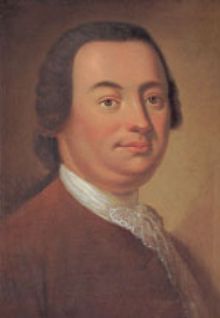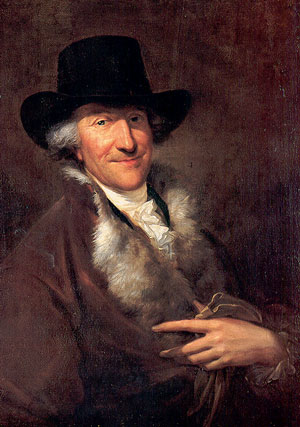<Back to Index>
- Composer Johann Christoph Friedrich Bach, 1732
- Composer Wilhelm Friedemann Bach, 1710
PAGE SPONSOR

Johann Christoph Friedrich Bach (21 June 1732 – 26 January 1795), the ninth son of Johann Sebastian Bach, sometimes referred to as the "Bückeburg Bach". He is not to be confused with other similarly named members of the Bach family.
Born in Leipzig in the Electorate of Saxony, he was taught music by his father, and also tutored by his distant cousin Johann Elias Bach. He studied at the St. Thomas School, and some believe he studied law at the university there, but there is no record of that. In 1750, Count Wilhelm von Schaumburg - Lippe appointed Johann Christoph harpsichordist at Bückeburg, and in 1759, he became Konzertmeister. While there, Bach collaborated with Johann Gottfried Herder, who provided the texts for six vocal works; the music survives for only four of these.
Bach wrote keyboard sonatas, symphonies, oratorios, liturgical choir pieces and motets, operas and songs. Because of Count Wilhelm's predilection for Italian music, Bach had to adapt his style accordingly, but he retained stylistic traits of the music of his father and of his brother, C.P.E. Bach.
He married the singer Lucia Elisabeth Münchhausen (1728 – 1803) in 1755 and the Count stood as godfather to his son Wilhelm Friedrich Ernst Bach. J.C.F. educated his son in music as his own father had, and Wilhelm Friedrich Ernst went on to become music director to Frederick William II of Prussia.
In April 1778 he and Wilhelm traveled to England to visit Johann Christian Bach.
The 1911 Encyclopædia Britannica says of him "He was an industrious composer, ... whose work reflects no discredit on the family name." He was an outstanding virtuoso of the keyboard, with a reasonably wide repertory of surviving works, including twenty symphonies, the later ones influenced by Haydn and Mozart; and hardly a genre of vocal music was neglected by him.
Professor Peter Schickele, in comparing his alter ego, the fictitious composer P.D.Q. Bach, to Johann Sebastian's other sons, said that P.D.Q. possessed "the obscurity of Johann Christoph Friedrich."
A significant portion of J.C.F. Bach's output was lost in the WWII destruction of the Staatliches Institut für Musikforschung in Berlin, where the scores had been on deposit since 1917. Bach's work shows him to have been a transitional figure in the mold of his half - brother C.P.E., his brother Johann Christian, the Grauns (Carl and Johann), and Georg Philipp Telemann, with some works in the style of the high Baroque, some in a galant idiom, and still others which combine elements of the two, along with traits of the nascent classical style.

Wilhelm Friedemann Bach (22 November 1710 – 1 July 1784), the second child and eldest son of Johann Sebastian Bach and Maria Barbara Bach, was a German composer and performer. Despite his acknowledged genius as an organist, improviser and composer, his income and employment were unstable and he died in poverty.
Wilhelm Friedemann (hereafter Friedemann) was born in Weimar, where his father was employed as organist and chamber musician to the Duke of Saxe - Weimar. In July 1720, when Friedemann was nine, his mother Maria Barbara Bach died suddenly; Johann Sebastian Bach remarried in December of 1721. J.S. Bach supervised Friedemann's musical education and career with great attention. The graded course of keyboard studies and composition that J.S. Bach provided is documented in the Clavier - Büchlein vor Wilhelm Friedemann Bach (modern spelling: Klavierbüchlein für Wilhelm Friedemann Bach), with entries by both father and son. This education also included (parts of) the French Suites, (Two - Part) Inventions, (Three - Part) Sinfonias (popularly known as "Inventions"), the first volume of The Well - Tempered Clavier, and the six Trio Sonatas for organ. At the age of 16 he went to Merseburg to learn the violin with his teacher Johann Gottlieb Graun.
In addition to his musical training, Friedemann received formal schooling beginning in Weimar. When J.S. Bach took the post of Cantor of the St. Thomas Church in Leipzig (in 1723), he enrolled Friedemann in the associated Thomasschule. (J.S. Bach — who had himself been orphaned at the age of 10 — said that he took the position in Leipzig partly because of the educational opportunities it afforded his children). On graduating in 1729, Friedemann enrolled as a law student in Leipzig University, a renowned institution at the time. He maintained a lifelong interest in mathematics, and continued to study it privately during his first job in Dresden.
Friedemann was appointed in 1733 to the position of organist of the St. Sophia's Church at Dresden. In competing for the post he played a new version of his father’s Prelude and Fugue in G Major, BWV 541. The judge described Friedemann as clearly superior to the other two candidates. He remained a renowned organist throughout his life. Among his many pupils in Dresden was Johann Gottlieb Goldberg, the keyboardist whose name is erroneously enshrined in the popular nickname given to J.S. Bach's 1742 publication, “Aria with Diverse Variations” — that is, “The Goldberg Variations.” The scholar Peter Williams has discredited the story linking the work to Goldberg, stating that J.S. Bach wrote the work for the Russian Ambassador Count Hermann Carl von Keyserlingk, who would ask his employee, Goldberg, to play variations for him to ward off insomnia. Williams instead has argued that J.S. Bach wrote the variations to provide a display piece for Friedemann.
In 1746 Friedemann became organist of the Liebfrauenkirche at Halle. In 1751, Friedemann married Dorothea Elisabeth Georgi (1721 – 1791), who was 11 years his junior and who outlived him by seven years. Dorothea was the daughter of a tax collector. The landed estates she inherited caused the family to be placed in a high tax bracket by Halle authorities, who were raising taxes to meet the revenue demands of the Seven Years War. To raise cash for these payments, she sold part of her property in 1770. The couple produced two sons and a daughter, Friederica Sophia (born in 1757), who was the only one of their offspring to live past infancy. The descendants of Friederica Sophia eventually migrated to Oklahoma.
Friedemann was deeply unhappy in Halle almost from the beginning of his tenure. In 1749 he was involved in a conflict with the Cantor of the Liebfrauenkirche, Gottfried Mittag, who had misappropriated funds that were due to Friedemann. In 1750 the church authorities reprimanded Friedemann for overstaying a leave of absence (he was in Leipzig settling his father's estate). In 1753 he made his first documented attempt to find another post, and thereafter made several others. All these attempts failed. Bach had at least two pupils, Friedrich Wilhelm Rust and Johann Samuel Petri.
In 1762, he negotiated for the post of Kapellmeister to the court of Darmstadt; although he protracted the negotiations for reasons that are opaque to historians and did not actively take the post, he nevertheless was appointed "Hofkapellmeister of Hessen - Darmstadt", a title he used in the dedication of his Harpsichord Concerto in E minor.
In June 1764, Friedemann left the job in Halle without any employment secured elsewhere. His financial situation deteriorated so much that in 1768 he re-applied for his old job in Halle, without success. He thereafter supported himself by teaching; not surprisingly, he died in penury. After leaving Halle in 1770, he lived for several years (1771 – 1774) in Braunschweig where he applied in vain for the post of an organist at the St. Catherine's church. Then he moved to Berlin, where he initially was welcomed by the princess Anna Amalia (the sister of Frederick the Great), but later fell into disgrace under still opaque circumstances. He died in Berlin.
Earlier biographers have concluded that his “wayward” and difficult personality reduced his ability to gain and hold secure employment, but the scholar David Schulenberg writes (in the Oxford Composer Companion: J.S. Bach, ed. Malcolm Boyd, 1999) that “he may also have been affected by changing social conditions that made it difficult for a self - possessed virtuoso to succeed in a church or court related position”. Schulenberg adds, “he was evidently less willing than most younger contemporaries to compose fashionable, readily accessible music”.
Friedemann Bach was renowned for his improvisatory skills. It is speculated that when in Leipzig his father's accomplishments set so high a bar that he focused on improvisation rather than composition. Evidence adduced for this speculation includes the fact that his compositional output increased in Dresden and Halle.
Friedemann’s compositions include many church cantatas and instrumental works, of which the most notable are the fugues, polonaises and fantasias for clavier, and the duets for two flutes. He incorporated more elements of the contrapuntal style learned from his father than any of his three composer brothers, but his use of the style has an individualistic and improvisatory edge which endeared his work to musicians of the late 19th century, when there was something of a revival of his reputation.
Friedemann's students included Johann Nikolaus Forkel, who in 1802 published the first biography of Johann Sebastian Bach; Friedemann, as well as his younger brother Carl Philipp Emanuel Bach, were major informants for Forkel. Friedemann has in earlier biographies been called a poor custodian of his father's musical manuscripts, many of which he inherited; however, more recent scholars are uncertain how many were lost. It is known that Friedemann sold some of his father's collection to raise cash to pay debts (including a large sale in 1759 to Johann Georg Nacke). Also, his daughter took some of the Sebastian Bach manuscripts with her when she moved to America, and these were passed on to her descendants, who inadvertently destroyed many of them. Others were passed on through his only known Berlin pupil, Sarah Itzig Levy, the daughter of a prominent Jewish family in Berlin and great aunt of Felix Mendelssohn; it was she who gave Mendelssohn the manuscript of the St. Matthew Passion, which she had received from Friedemann. Some of his scores were collected by Carl Friedrich Christian Fasch and his pupil Carl Friedrich Zelter, the teacher of Felix Mendelssohn and through them these materials were placed in the library of the Berlin Singakademie, which Fasch founded in 1791 and Zelter took charge of in 1800.
Friedemann is known occasionally to have claimed credit for music written by his father, but this was in keeping with common musical practices in the era.
Wilhelm Friedemann Bach is not to be confused with Wilhelm Friedrich Ernst Bach, his nephew, also a composer. Friedemann himself may have been one of the models for Diderot's philosophical dialog Rameau's Nephew (Le Neveu de Rameau).